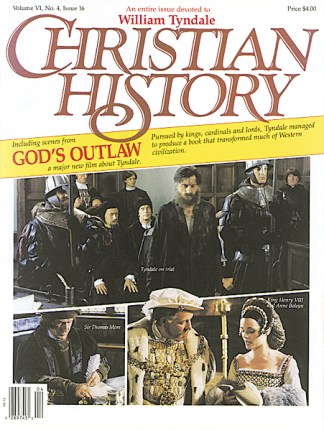The four decades of Tyndale’s life, from the early 1490s to the mid-1530s, overlapped one of the most notable periods of change in Western history, incuding: the ending of the Dark Ages, the beginnings of the Renaissance, the claiming of the New World, the Spanish Inquisition, and the beginnings of the Reformation.
At the time Tyndale might have felt detached from it all, living the lonely and unrooted life of a fugitive and exile. But in the long view he was actually integral to some of the most significant moments and movements ofthe early 16th century—great societal upheavals, the aftershocks of which are still being felt in our modern world.
William Tyndale
c. 1492–95 Tyndale is born
1508 A young teenager, he enters Magdalen College at Oxford
1512 Completes his B.A. at Oxford
1514–1515 Completes his M.A. at Oxford and is ordained, but refuses to enter monastic orders
1519 Moves to Cambridge for doctoral studies, then quits
1521–1523 Begins teaching at Little Sodbury, gets into disputes with priests
c. 1524 Seeks patronage of Bishop Tunstall and is rebuffed; then, assisted by Monmouth, he travels to Germany and registers at the University of Wittenburg
1525 In Cologne, he prepares to print an English New Testament; but he is discovered and escapes with only a few printed portions
1526 He completes the printing in Worms, and smuggled copies of his New Testaments are soon being circulated throughout England
1527 Bishop Tunstall orders the purchase and burning of all the testaments; but this serves only to finance Tyndale’s second edition
1527–1530 English agents seek to capture Tyndale on the Continent; he keeps moving, and writing
1530 His translation of the the first five books of the Old Testament appears in England
1531 He meets Henry’s agent Steven Vaughan, but declines the king’s invitation to return to England
1531 Sir Thomas More begins writing against Tyndale
1533 His good friend, John Frith, is burned at the stake in Smithfield
1534 He moves into Thomas Poyntz’s English merchants’ boarding house in Antwerp
1535 King’s agent Henry Phillips arrives in Antwerp and befriends Tyndale, then arranges to have him arrested while the Poyntzes are out of town; Tyndale is cast into Vilvoorde prison near Antwerp
1536 Fifteen months later at Vilvoorde, Tyndale is strangled to death and his body burned at the stake
Church History
1480 Ferdinand and Isabella of Spain appoint inquistors against heresy among converted Jews
1492 Inquisitor-general Torquemada gives Spanish Jews three months to convert or leave country
1492 The promiscuous Rodrigo Borgia becomes Pope Alexander VI
1497 The College of Cardinals discusses a church bill condemning “licentious clergy,” but the idea is soon dropped
1501 Papal bull orders the burning of any books questioning Church’s authority
1505 John Knox , the leader of the Scottish Reformation, is born
1509 John Calvin, the Swiss Reformer, is born (d. 1564)
1516 Erasmus publishes the New Testament in Greek and Latin
1516 Sir Thomas More writes Utopia
1517 Martin Luther posts his 95 Theses
1518 Luther refuses to recant at Diet of Augsburg
1519 Luther questions papal infallibility in a debate
1519 Zwingli begins Swiss Reformation
1520 Luther publicly burns Pope Leo X’s excommunication bull
1522 Anabaptist movement begins in Germany
1529 Luther and Zwingli dispute at Marburg about the Eucharist
1534 Pope Paul III, the father of three illegitimate children, comes to power
1534 Luther completes translation of Bible into German
World History
1452–1519Leonardo da Vinci lives and observes human anatomy and constructs designs for “helicopters,” “machine guns” and water turbines
1492–1504 Christopher Columbus discovers America, crosses Atlantic four times
1509 Henry VIII assumes English throne
1512 Ponce de Leon discovers Florida
1512 Copernicus publishes that the earth actually revolves around the sun
1513 Henry conducts brief invasion of France
1515 Thomas Wolsey is appointed Cardinal and Lord Chancellor of England
1516–1556 Charles I of Spain (Emperor Charles V) reigns
1518–22 The Spanish carry out their conquest of Mexico
1521 The Turks capture Belgrade
1527 Charles V sacks Rome
1534 Henry declares the Act of Supremacy, which made him ultimate authority in England, even above the Pope
1537 Henry encourages the distribution of Matthew Coverdale’s English Bible—mostly comprised of Tyndale’s work virtually unaltered—“abroad among the people”
1539 Henry encourages all printers and sellers of books to provide for the “free and liberal use of the Bible in our own maternal English tongue”
Copyright © 1987 by the author or Christianity Today/Christian History magazine. Click here for reprint information on Christian History.










